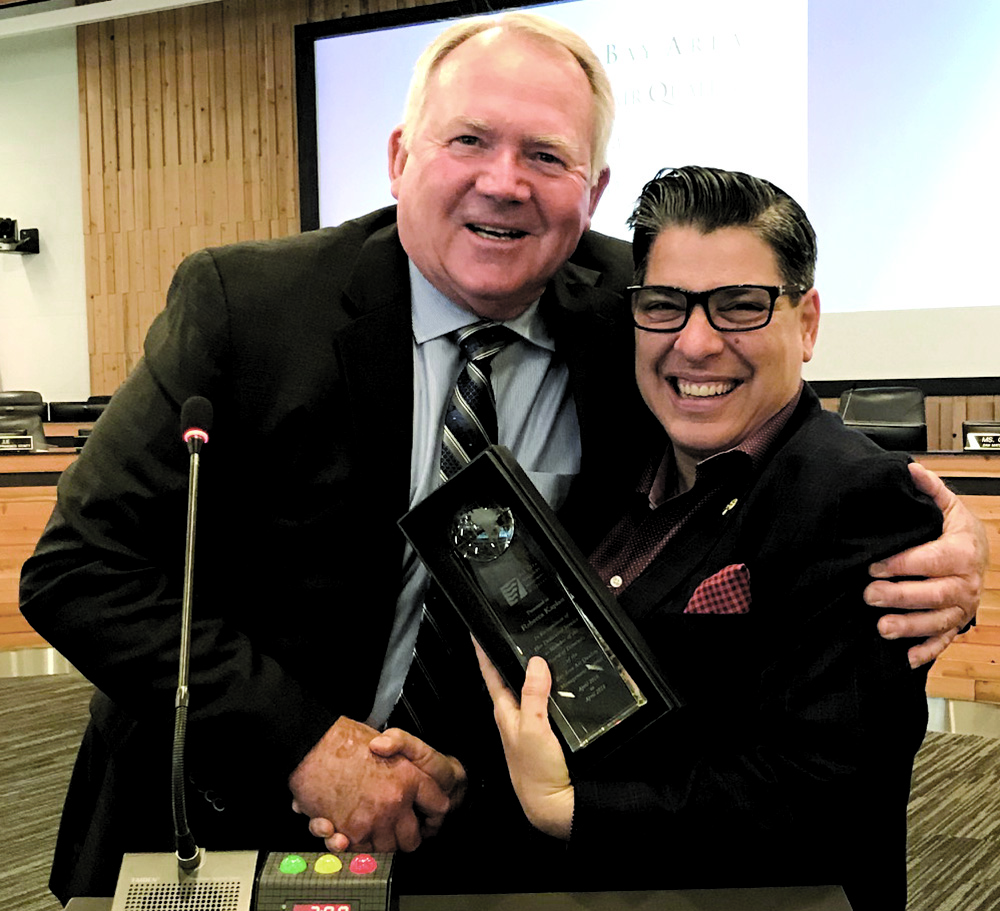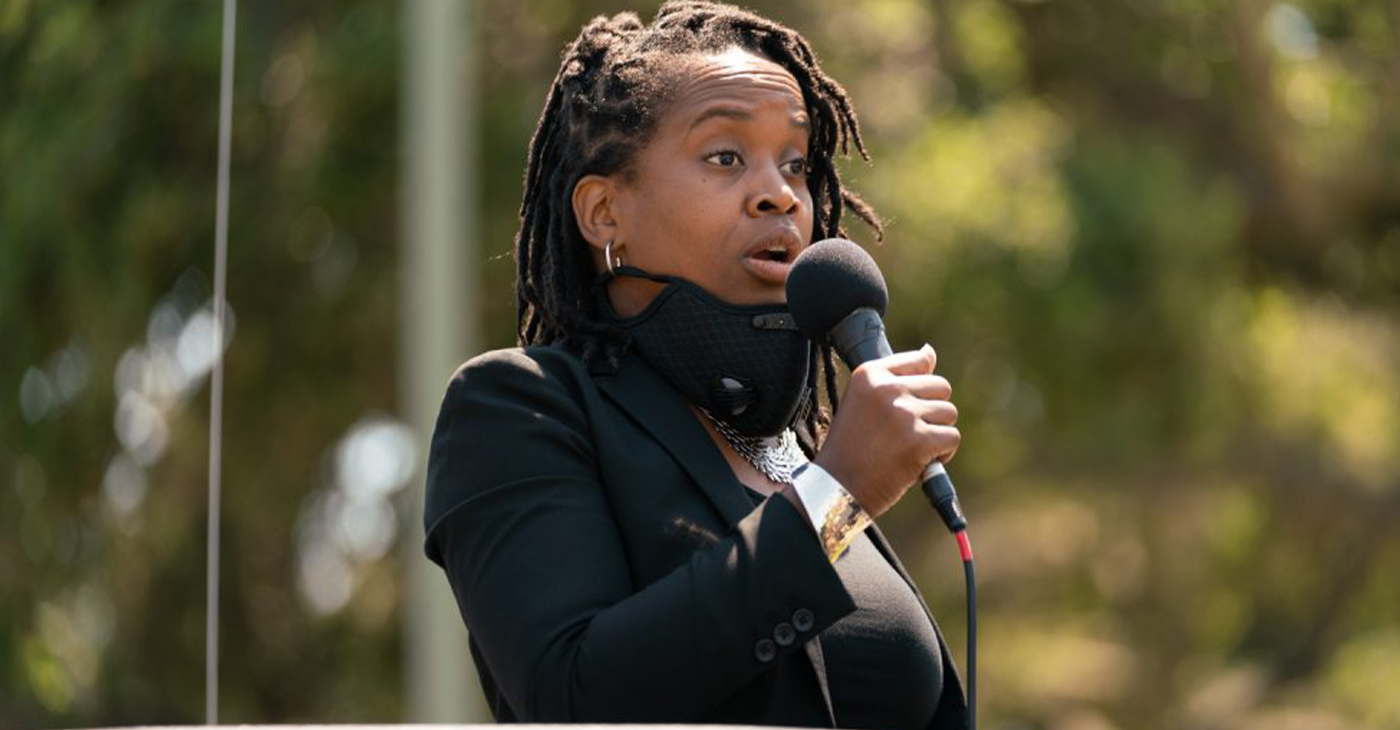City Government
Mayor’s Role in Taking Kaplan Off Air Quality Board “Is Politics at Its Worst,” Says Boardmember

Councilmember Rebecca Kaplan received appreciation and an award on her lat last day on Bay Area Air Quality Management (BAAQMD) board. Kaplan is shown with BAAQMD board Chair David Hudson, member of the San Ramon City Council.
Members of the Bay Area Air Quality Management District (BAAQMD) board paid tribute recently to Oakland City Councilmember-at-Large Rebecca Kaplan at her last meeting on the regional body. A few members criticized Mayor Libby Schaaf for indulging in “politics at its worst” to remove the councilmember from the BAAQMD board and encouraged Oakland residents to work for Kaplan for mayor.
“It’s ridiculous that you have to leave this board. I think it’s politics at its worst,” said Supervisor Shirlee Zane, a board member representing Sonoma County.
“The fact that someone bright and capable and articulate as you is being replaced after two years, well shame on the mayor,” she said.
Added Boardmember Supervisor Scott Haggerty, representing Alameda County, “For those of you who think Rebecca should be here, maybe you should help her run for mayor.”
Kaplan, who served for two years as one of Alameda County’s two representatives on the 24-member board, whose members come from cities and counties from Napa to Palo Alto.
According to a spokesman of the Alameda County Mayors’ Conference, which appoints a representative on the BAAQMD board, mayors have first preference in seeking appointments, but Mayor Schaaf had the right to nominate Kaplan for reappointment to the position.
Kaplan was “not precluded” from reapplying, according to the spokesman, but, “If a council member applies for a position, the councilmember (must) receive the approval of the mayor,” the Mayors’ Conference spokesman said.
Instead of nominating Kaplan and despite a deluge of community letters in support of her reappointment, Schaaf nominated the mayor of Berkeley. In March, the Mayor’s Conference voted to give the position to the mayor of Emeryville.
In her response to the letters in support of Kaplan, Schaaf said her hands were tied, and that she was precluded by the rules of the County Mayors’ Conference from reappointing Kaplan to the board.
As Oakland’s first representative on the board 25 years, Kaplan worked to bring funds to improve air quality in the city, which persistently has had some of the highest levels of air-borne toxic wastes—including cancer—and asthma-causing pollutants—in the Bay Area.
Kaplan has helped secure money for major projects to improve air quality for Oakland and other East Bay cities, including for the Broadway Shuttle, replacing a diesel locomotive engine to clean the air around the Port/Army base and setting up a fund to get old, high polluting diesel trucks off the road.
Members of the BAAQMD board praised Kaplan for what she has been able to accomplish in only two years.
“(Kaplan) represents the kind of person that is the reason I want to be on this board, someone who is a critical thinker, thinks about the big picture and has helped to shape a unique profile for the district,” said Boardmember Mayor Doug Kim of the City of Belmont.
Another board member referred to the time when Kaplan went to North Dakota to stand in solidarity with Dakota Access Pipeline protests (#NODAPL). “That’s walking the talk, you really did it. I thought after that: ‘you know what, Rebecca really means it,’” said Mayor Liz Kniss, City of Palo Alto.
“You’ve distinguished yourself as a thoughtful advocate for human health. You’ve done a very effective job articulating concerns in communities most affected by air pollution, which certainly includes your city (and) which your mayor should appreciate. I know we do,” said Vice Mayor Rod Sinks, City of Cupertino.
“We’ve gotten the message about cash for clunkers. We’ll make sure we carry that mantle,” said Supervisor David J. Canepa, San Mateo Count.
Speaking to the board, Jed Holtzman of 350.org Bay Area member said, Rebecca is the kind of textbook example of what the public would like to see on this board and any board in terms of consciousness and engagement.”
She paraphrased a minister she knows in her remarks: “If you woke up this morning, you still have work to do. I ain’t done.”
The video of the discussion at the April 4 BAAQMD board meeting can be viewed here.
Activism
Oakland Post: Week of December 24 – 30, 2025
The printed Weekly Edition of the Oakland Post: Week of – December 24 – 30, 2025

To enlarge your view of this issue, use the slider, magnifying glass icon or full page icon in the lower right corner of the browser window.
Alameda County
Oakland Council Expands Citywide Security Cameras Despite Major Opposition
In a 7-1 vote in favor of the contract, with only District 3 Councilmember Carroll Fife voting no, the Council agreed to maintain its existing network of 291 cameras and add 40 new “pan-tilt-zoom cameras.”

By Post Staff
The Oakland City Council this week approved a $2.25 million contract with Flock Safety for a mass surveillance network of hundreds of security cameras to track vehicles in the city.
In a 7-1 vote in favor of the contract, with only District 3 Councilmember Carroll Fife voting no, the Council agreed to maintain its existing network of 291 cameras and add 40 new “pan-tilt-zoom cameras.”
In recent weeks hundreds of local residents have spoken against the camera system, raising concerns that data will be shared with immigration authorities and other federal agencies at a time when mass surveillance is growing across the country with little regard for individual rights.
The Flock network, supported by the Oakland Police Department, has the backing of residents and councilmembers who see it as an important tool to protect public safety.
“This system makes the Department more efficient as it allows for information related to disruptive/violent criminal activities to be captured … and allows for precise and focused enforcement,” OPD wrote in its proposal to City Council.
According to OPD, police made 232 arrests using data from Flock cameras between July 2024 and November of this year.
Based on the data, police say they recovered 68 guns, and utilizing the countywide system, they have found 1,100 stolen vehicles.
However, Flock’s cameras cast a wide net. The company’s cameras in Oakland last month captured license plate numbers and other information from about 1.4 million vehicles.
Speaking at Tuesday’s Council meeting, Fife was critical of her colleagues for signing a contract with a company that has been in the national spotlight for sharing data with federal agencies.
Flock’s cameras – which are automated license plate readers – have been used in tracking people who have had abortions, monitoring protesters, and aiding in deportation roundups.
“I don’t know how we get up and have several press conferences talking about how we are supportive of a sanctuary city status but then use a vendor that has been shown to have a direct relationship with (the U.S.) Border Control,” she said. “It doesn’t make sense to me.”
Several councilmembers who voted in favor of the contract said they supported the deal as long as some safeguards were written into the Council’s resolution.
“We’re not aiming for perfection,” said District 1 Councilmember Zac Unger. “This is not Orwellian facial recognition technology — that’s prohibited in Oakland. The road forward here is to add as many amendments as we can.”
Amendments passed by the Council prohibit OPD from sharing camera data with any other agencies for the purpose of “criminalizing reproductive or gender affirming healthcare” or for federal immigration enforcement. California state law also prohibits the sharing of license plate reader data with the federal government, and because Oakland’s sanctuary city status, OPD is not allowed to cooperate with immigration authorities.
A former member of Oakland’s Privacy Advisory Commission has sued OPD, alleging that it has violated its own rules around data sharing.
So far, OPD has shared Flock data with 50 other law enforcement agencies.
Activism
Black Arts Movement Business District Named New Cultural District in California
Located in the heart of District 3, the BAMBD is widely regarded as one of the nation’s most important centers of Black cultural production — a space where artists, entrepreneurs, organizers, and cultural workers have shaped generations of local and national identity. The state’s recognition affirms the district’s historic importance and its future promise.

By Post Staff
Oakland’s Black Arts Movement Business District (BAMBD) has been selected as one of California’s 10 new state-designated Cultural Districts, a distinction awarded by the California Arts Council (CAC), according to a media statement released by Councilmember Carroll Fife.
The BAMBD now joins 23 other districts across the state recognized for their deep cultural legacy, artistic excellence, and contributions to California’s creative economy.
Located in the heart of District 3, the BAMBD is widely regarded as one of the nation’s most important centers of Black cultural production — a space where artists, entrepreneurs, organizers, and cultural workers have shaped generations of local and national identity. The state’s recognition affirms the district’s historic importance and its future promise.
“This designation is a testament to what Black Oakland has built — and what we continue to build when we insist on investing in our own cultural and economic power,” said Fife.
“For years, our community has fought for meaningful recognition and resources for the Black Arts Movement Business District,” she said. “This announcement validates that work and ensures that BAMBD receives the support it needs to grow, thrive, and continue shaping the cultural fabric of California.”
Since taking office, Fife has led and supported multiple initiatives that strengthened the groundwork for this achievement, including:
- Restoring and protecting arts and cultural staffing within the City of Oakland.
- Creating the West Oakland Community Fund to reinvest in historically excluded communities
- Advancing a Black New Deal study to expand economic opportunity for Black Oakland
- Ensuring racial equity impact analyses for development proposals, improving access for Black businesses and Black contractors
- Introduced legislation and budget amendments that formalized, protected, and expanded the BAMBD
“These efforts weren’t abstract,” Fife said. “They were intentional, coordinated, and rooted in a belief that Black arts and Black businesses deserve deep, sustained public investment.”
As part of the Cultural District designation, BAMBD will receive:
- $10,000 over two years
- Dedicated technical assistance
- Statewide marketing and branding support
- Official designation from Jan. 1, 2026, through Dec. 31, 2030
This support will elevate the visibility of BAMBD’s artists, cultural organizations, small businesses, and legacy institutions, while helping attract new investment to the district.
“The BAMBD has always been more than a district,” Fife continued. “This recognition by the State of California gives us another tool in the fight to preserve Black culture, build Black economic power, and protect the families and institutions that make Oakland strong.”
For questions, contact Councilmember Carroll Fife at CFife@oaklandca.gov.
-

 Alameda County4 weeks ago
Alameda County4 weeks agoSeth Curry Makes Impressive Debut with the Golden State Warriors
-

 Bay Area3 weeks ago
Bay Area3 weeks agoPost Salon to Discuss Proposal to Bring Costco to Oakland Community meeting to be held at City Hall, Thursday, Dec. 18
-

 #NNPA BlackPress4 weeks ago
#NNPA BlackPress4 weeks agoFBI Report Warns of Fear, Paralysis, And Political Turmoil Under Director Kash Patel
-

 Activism3 weeks ago
Activism3 weeks agoMayor Lee, City Leaders Announce $334 Million Bond Sale for Affordable Housing, Roads, Park Renovations, Libraries and Senior Centers
-

 Activism3 weeks ago
Activism3 weeks agoOakland Post: Week of December 10 – 16, 2025
-

 Arts and Culture3 weeks ago
Arts and Culture3 weeks agoFayeth Gardens Holds 3rd Annual Kwanzaa Celebration at Hayward City Hall on Dec. 28
-

 Activism3 weeks ago
Activism3 weeks agoOakland School Board Grapples with Potential $100 Million Shortfall Next Year
-

 Activism3 weeks ago
Activism3 weeks ago2025 in Review: Seven Questions for Black Women’s Think Tank Founder Kellie Todd Griffin





















































